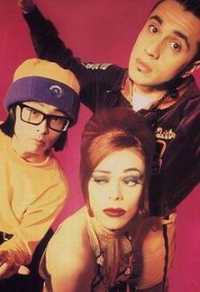Deee-Lite was a surreal trio of New York musicians, comprising Dmitri Brill (originally from Russia), Towa Tei (originally from Korea via Japan) and chanteuse and aspiring disco diva Kier Kirby. Deee-Lite erupted on the New York club scene with the single Groove Is In The Heart. The joyful romp that was their debut album, World Clique (Elektra, 1990), redefined techno as futuristic kitsch, a genre for the masses with a sense of humour. Infinity Within (Elektra, 1992), with Rubber Love, and Dewdrops In The Garden (Elektra, 1994) were vastly inferior albums.
In the meantime, Towa Tei had already launched his solo career with Future Listening (Elektra, 1995). By relying more heavily on samples (and guest vocalists) and expanding his vision towards jazz and world-music, Tei came up with an intriguing take on lounge music. The instrumental manifesto, I Want To Relax, is a fanfare of fragmented charleston. That sets the tone for a parade of funny masquerades that (as far as fun goes) culminate with Son Of Bambi, an exuberant fusion of Indian and western dance music. Other entertaining sketches include Technova, that simulates the easy-listening soundtracks of the 1960s and injects a touch of Brazilian pop and a romantic saxophone, and Luv Connection, a more serious tribute to disco-funk, while Brazilian pop gets explicitly deconstructed in the effervescent Batucada. The feeling is joyous, but only on the surface: a sudden pause, a distortion, a solo are enough to cast a sinister shadow on the game. To crown the disc, the 12-minute Dubnova is a majestic collage of Sixties' "du-be-du" vocals, dance beats, blues/jazz jamming, tribal drums, electronic music, etc, that dissolves in a mythical place, somewhere between a faraway nebula and a zen garden.
With Sound Museum (Japan, 1996 - Elektra, 1997), instead, Tei gave a pretentious, polyglot experiment on his favorite genres (rhythm and blues, bossanova, hip hop, samba, drum'n'bass and jazz) that worked only with the exotic electronic soul of Everything We Do Is Music.
Despite the quantity and quality of collaborators, and despite Tei's technical skills, Last Century Modern (Elektra, 1999) is short on inspiration. The usual parade of styles, and the impeccable collage art rarely churn out more than cold essays on dance production techniques (Congratulations, Funkin' For Jamaica) and on pop production techniques (Angel, Butterfly). The futuristic, accordion-driven lounge music of Last Century Modern is cute, but then, again, we have heard it before on Tei's albums.
